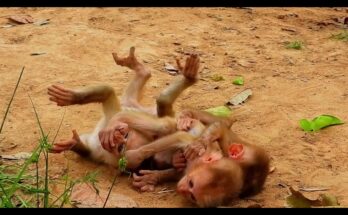Deep in the wilderness of East Africa, a Hadza hunter sits quietly by a small fire, the scent of smoke rising into the evening air. Over the flames, pieces of monkey meat sizzle gently — a traditional meal prepared by one of the last true hunter-gatherer tribes in the world.
The Hadza people of Tanzania live much as their ancestors did thousands of years ago, relying on hunting and foraging to survive. Their diet is shaped by nature — honey, berries, tubers, and wild game. For the Hadza, hunting monkeys, though controversial to outsiders, is part of their survival and cultural heritage.
The hunter, with steady hands and sharp focus, turns the meat carefully over the fire. His bow and arrows lie beside him, still dusty from the day’s pursuit. This monkey was hunted not for sport, but for food — a precious resource in a harsh environment where every meal matters.
To the Hadza, nothing is wasted. The meat will be shared with others in the camp. Bones may be used for tools, and the hunt itself is often followed by stories passed from generation to generation — tales of courage, skill, and respect for the land.
While such scenes may be difficult for some to watch, they offer a powerful look into a way of life that is vanishing fast. The Hadza live in harmony with nature, taking only what they need. Their survival depends on deep knowledge of the land and a strong bond with the ecosystem around them.
This moment, a Hadza hunter grilling monkey meat in the wild, is more than just a meal — it’s a reflection of ancient traditions, resilience, and the raw reality of life in the wild.


